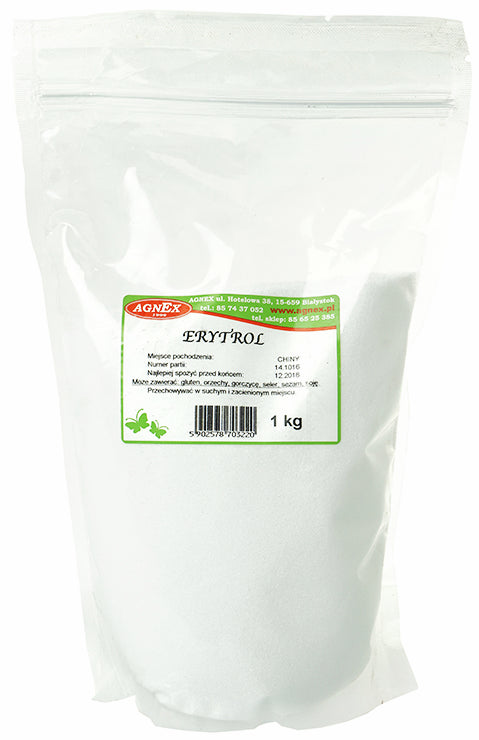Erytrol Erythritol 1 kg AGNEX
- Regular price
- €8,80
- Regular price
-
- Sale price
- €8,80
- Unit price
- per
Couldn't load pickup availability
Description
xDESCRIPTION
- a sweetener that has only 0.2 kcal
- has a glycemic index of zero
- it inhibits the action of bacteria that cause tooth decay
- the perfect replacement for conventional sugar
Erythrol is a sweetener (E968). Erythrol and Erythritol are interchangeable names of the same product. It is a sweetener that belongs to the group of polyhydroxy or sugar alcohols. It is obtained by fermenting glucose with yeast. Erythrol is a natural substance found in some fruits, seaweed, and red wine. This substance contains negligible amounts of calories and has an almost zero glycemic index. When consumed, it leaves a slightly cooling sensation in the mouth.
1g of erythritol has only about 0.2 kcal, which is why it is called a "calorie-free sweetener". Among the sweeteners available, it is the lowest calorie option with virtually no nutritional value, making it ideal for people trying to control and reduce calories. Erythrol is not metabolized by our body as we do not have an enzyme to break it down in our body. It is almost completely excreted and does not affect the intestinal microflora at all. It should not be used by children under 3 years old due to the not yet fully developed digestive system, and besides it has no contraindications and side effects.
In food, erytrol is increasingly being used to make healthy sweets. Jams, candied fruit, chewing gum and the manufacture of dietary supplements for people who need to eliminate sugar from their diet. It not only acts as a sweetener, but also serves as a flavor enhancer, thickener and a substance that prevents changes in the consistency, color and taste of the product.
Erythritol has a positive effect on our body acts as an antioxidant and protects teeth. As an antioxidant, it combines with free radicals and protects our body from their harmful effects. It also has the ability to inhibit sugar fermentation that takes place by bacteria of the Streptococcus genus, which can cause tooth decay.
INTERESTING PROPERTIES
When replacing sugar with erythritol in recipes, we should use the following ratio: Change 5g of sugar to about 7g of erythritol.
It is not recommended to use erythritol to bake yeast cakes as it slows down the rise of the dough. It is often added to other sweeteners, such as aspartame, in products to reduce their unwanted aftertaste and enhance their sweet taste. In cosmetics, it serves as a substitute for glycerin, which acts as a preservative, i.e. protects the product from spoilage.
APPLICATION
As a sweetener for all kinds of drinks, teas, pastries and for cooking.
Erythritol is not recommended for baking yeast cakes because it slows the rise of the dough.
ALLERGY INFORMATION
Gluten, mustard, celery, sesame, soy.
similar products
- Regular price
- €8,80
- Regular price
-
- Sale price
- €8,80
- Unit price
- per
- Regular price
- €8,80
- Regular price
-
- Sale price
- €8,80
- Unit price
- per
- Regular price
- €8,80
- Regular price
-
- Sale price
- €8,80
- Unit price
- per
- Regular price
- €8,80
- Regular price
-
- Sale price
- €8,80
- Unit price
- per
- Regular price
- €8,80
- Regular price
-
- Sale price
- €8,80
- Unit price
- per
- Regular price
- €8,80
- Regular price
-
- Sale price
- €8,80
- Unit price
- per
- Regular price
- €8,80
- Regular price
-
- Sale price
- €8,80
- Unit price
- per
- Regular price
- €8,80
- Regular price
-
- Sale price
- €8,80
- Unit price
- per
- Regular price
- €8,80
- Regular price
-
- Sale price
- €8,80
- Unit price
- per
- Regular price
- €8,80
- Regular price
-
- Sale price
- €8,80
- Unit price
- per
Recently Viewed Products
- Regular price
- €8,80
- Regular price
-
- Sale price
- €8,80
- Unit price
- per
- Regular price
- €8,80
- Regular price
-
- Sale price
- €8,80
- Unit price
- per
- Regular price
- €8,80
- Regular price
-
- Sale price
- €8,80
- Unit price
- per
- Regular price
- €8,80
- Regular price
-
- Sale price
- €8,80
- Unit price
- per
- Regular price
- €8,80
- Regular price
-
- Sale price
- €8,80
- Unit price
- per
- Regular price
- €8,80
- Regular price
-
- Sale price
- €8,80
- Unit price
- per
- Regular price
- €8,80
- Regular price
-
- Sale price
- €8,80
- Unit price
- per
- Regular price
- €8,80
- Regular price
-
- Sale price
- €8,80
- Unit price
- per
- Regular price
- €8,80
- Regular price
-
- Sale price
- €8,80
- Unit price
- per
- Regular price
- €8,80
- Regular price
-
- Sale price
- €8,80
- Unit price
- per
- Choosing a selection results in a full page refresh.











